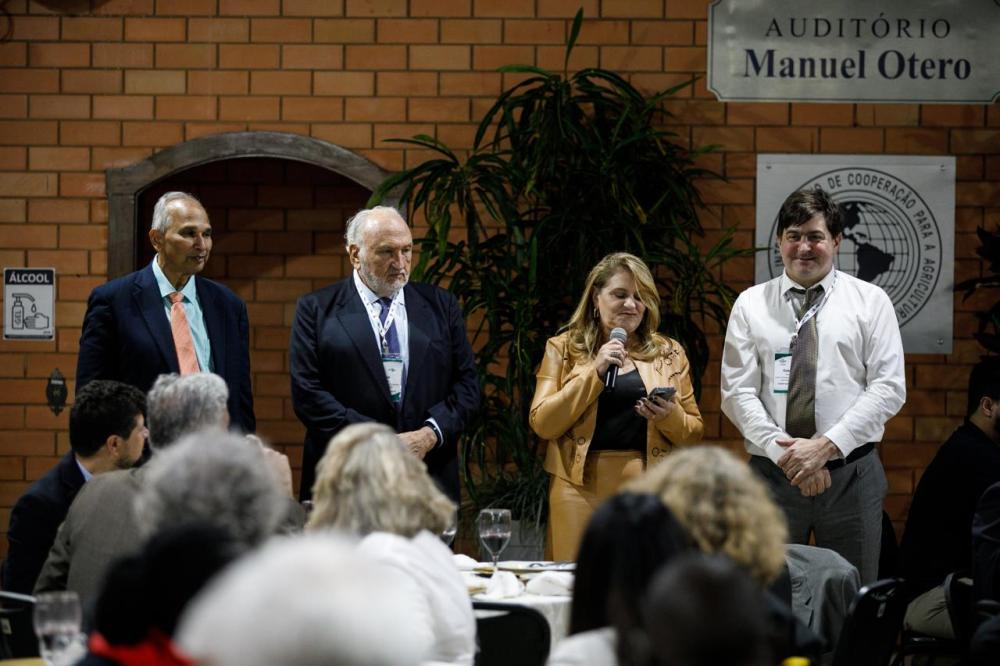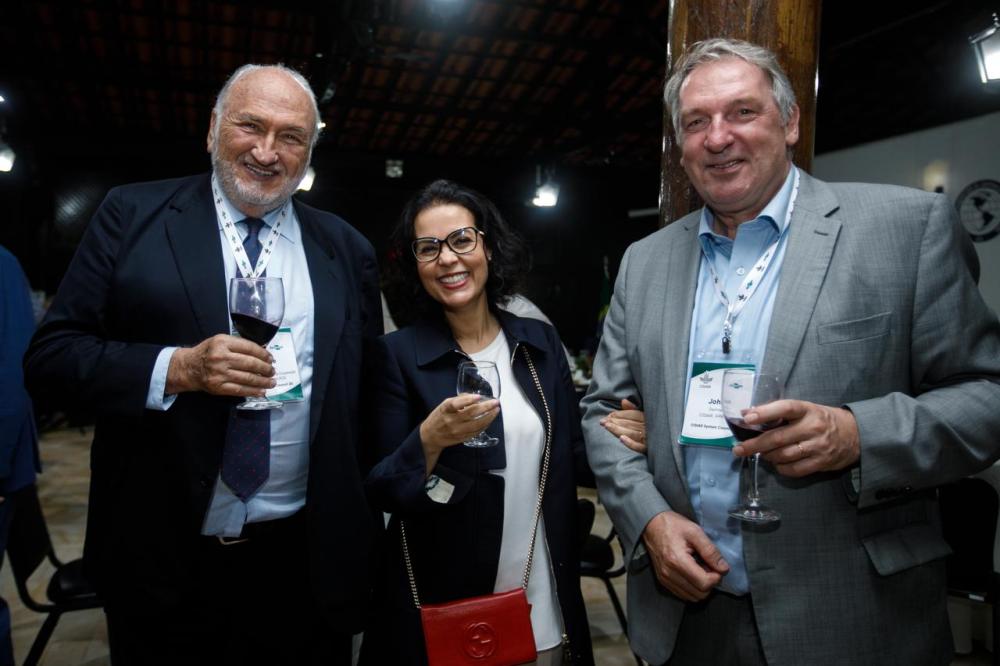Over one hundred international researchers from CGIAR gathered at the IICA Delegation in Brazil

Brasilia, 14 June 2024 (IICA) - The immense challenges that climate change and new global trends impose on food and agricultural systems are transforming production methods and, consequently, the entire world. This transformation makes agricultural research essential, as it faces the challenge of quickly contributing to facilitate the necessary adaptations.
Under these premises, the Inter-American Institute for Cooperation on Agriculture (IICA) is increasing its close collaboration with research organizations worldwide. Recently, it welcomed over 100 international agricultural researchers at its Delegation in Brasília. These researchers participated in the 20th annual meeting of the Consultative Group on International Agricultural Research (CGIAR), held this year at the headquarters of the Brazilian Agricultural Research Corporation (EMBRAPA).
Over one hundred researchers and the President of EMBRAPA, Silvia Masshurá, were welcomed by the Regional Coordinator and IICA Representative in Brazil, Gabriel Delgado, and by the Special Advisor to the IICA Director General, Jorge Werthein, who received them on behalf of the Director General, Manuel Otero. The Director of Technical Cooperation of IICA, Muhammad Ibrahim, also attended the meeting.
In welcoming the researchers at the Institute's Delegation in Brazil, Werthein, on behalf of IICA's Director General, emphasized the need to intensify joint efforts to ensure that partnerships yield results and, through the path of science and innovation, tackle the challenges threatening food, nutritional, and climate security.
Established over 50 years ago, CGIAR is the world's largest agricultural innovation network. The institution provides scientific evidence to decision-makers and new tools to its partners to transform agri-food systems and facilitate better economic, environmental, and nutritional use of agriculture.
"Today, CGIAR represents 13 research centers with over 10,000 people in about 80 countries and has 3,000 partners," explained CGIAR Executive Director Ismahane Elouafi. She added that these centers work to transform agri-food systems, and land and water use. In Latin America, the centers are located in Mexico, Peru, and Colombia.
"The Council meeting at EMBRAPA and this meeting organized by IICA are very beneficial for achieving more results for the region and more resources for Africa and Asia, with experiences coming from Latin America and the Caribbean. IICA has influence and convening power amongst agriculture ministries, which opens many doors for us," said Joaquín Lozano, CGIAR Regional Director for Latin America.
He added that for CGIAR, agricultural research must have a positive impact on food security, income distribution, and job creation, as well as environmental protection. "Research must translate into actions that alleviate poverty and promote the responsible and sustainable use of natural resources," he emphasized.
More cooperation, more development
At the Council meeting, IICA’s Director of Technical Cooperation made a presentation on the Institute's guiding principles, such as availability, equity, and access to food, as well as its work agenda, which is divided into programs on bioeconomy, climate, health, gender, digital inclusion, and family farming.
"We advocate for agriculture to be part of the solution to climate challenges. It is important to place more emphasis on climate change adaptation so that producers have the tools to adapt. IICA has been providing support that aligns with the Climate Change, Biodiversity, and Desertification Conventions," said Ibrahim, who explained to the researchers the Living Soils of the Americas initiative to improve resilience and promote ecosystem services; the Observatory of Public Policies (OPSAa); and IICA's water and sustainable livestock platforms.
"Another topic that was discussed was fortified rice, which we are helping to implement in Chile, the Caribbean, Suriname, and Guyana, among other countries. This initiative has assisted producers in adopting good practices to improve food quality," he said.
"This group of experts from the private sector, national researchers, and international centers are seeking cooperation opportunities. They have engaged in dialogue to discuss how IICA can work more closely with CGIAR to achieve greater impact and scale in the results for the region, and how to influence the policies we are promoting through research. We have the PROCIS system, which can cooperate with CGIAR," he concluded.
The PROCIS system is a cooperation and alignment agreement that currently includes the Cooperative Program for Agri-Food Technological Development of the Southern Cone (PROCISUR), which brings together the national agricultural research institutes of Argentina, Brazil, Chile, Uruguay, and Paraguay, and PROCINORTE, which brings together the institutes of Canada, the United States, and Mexico.

EMBRAPA and COP30
The President of EMBRAPA, Silvia Massruhá, thanked IICA for hosting the CGIAR researchers, who chose to hold the Council meeting in Brazil this year to commemorate the 50th anniversary of the Brazilian agricultural research corporation. "I hope to see you all again in Brazil next year for COP30 in Belém," she said.
Massruhá and Elouafi signed a memorandum of understanding at EMBRAPA's headquarters in Brasilia to strengthen collaboration in developing research on resilient food systems in the context of climate change.
The President of EMBRAPA also recalled the support received from IICA during the meeting of agricultural science researchers from G20 countries in Brasilia in May, coordinated by EMBRAPA with the participation of scientist Rattan Lal, and reinforced the company's commitment to COP30, when, she said, it will be possible to share perspectives and solutions to climate change.
For Elouafi, the expectation is that the memorandum of understanding will lead to new areas being prioritized, mainly related to the adaptation and resilience of production systems and strategic crops.
"We commit to collaborating through knowledge exchange and joint projects, leveraging each other's technical capabilities and assets," said Elouafi, expressing solidarity with the victims of the floods in Rio Grande do Sul and emphasizing the importance of the scientific community in finding solutions to reduce the impacts of future climate-related disasters.
In addition to agricultural researchers, representatives from private organizations and other sectors were present, such as Rubén Echeverría from the Research and Innovation for Agricultural Transformation area of the Bill and Melinda Gates Foundation..

Many participants have already established partnerships with IICA, such as Wendy Francesconni from Bioversity International and the International Center for Tropical Agriculture (CIAT), who stated that "IICA is an important partner and an active collaborator in positioning the region as key to the world's food challenges."
Johan Swinnen, Director General of the International Food Policy Research Institute (IFPRI), based in Washington with operations in Asia, Africa, and Latin America, said, "We work closely with IICA on various projects, so IICA is a great entry point because it covers the entire region, which is why we organize events together and will likely host activities related to the transformation of food systems together."
Other participants had the opportunity to learn more about IICA during the presentation by the Director of Technical Cooperation at the CGIAR Council meeting, such as Mpumi Obokoh, from South Africa, and Vice Chair of the Independent Science and Development Council (ISDC).
A molecular plant scientist, she works in South-South Cooperation. "I did not know IICA, and from the presentation I saw, I realized that it is open, working on many topics, and for us in Africa, it would be good to be in contact to learn best practices and implement cooperation because, with climate change, we need solutions, but also nutritious food for people, as the population is growing and we need to find more sustainable solutions, and for that, scientific advice is essential," she said.
Magali García, from Bolivia, an ISDC member and researcher at the University of Bolivia, visited IICA's office in Bolivia and worked jointly on a project on organic soils. She currently works on projects related to soil organic carbon and climate change with smallholder farmers and does research in food production in the Andes at altitudes above 3,000 meters.
Garba Sharubutu, Executive Director of Nigeria's Department of Agriculture, where he coordinates the work of 16 agricultural institutes, one of which dedicated to staple crops, described the need for laboratory training and capacity development cooperation. "We send our scientists to learn about what is happening in Brazil, China, and India. I already knew a lot about EMBRAPA, but not about IICA. It will be very good to establish a connection with IICA, as we are also in the tropics."
More information:
Institutional Communication Division.
comunicacion.institucional@iica.int